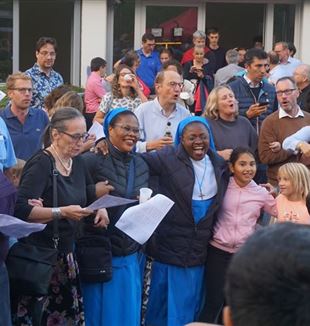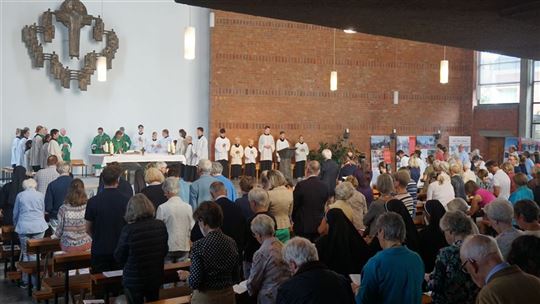
Bonn: re-proposing the faith today, beyond divisions
Listening and dialogue without giving up the proclamation of truth. This is how a community of priests from Fraternity of St. Charles is reviving the life of their parish in Bad Godesberg, in the middle of the Synodal Way of the German Church.When they heard it, they could hardly believe it: for the first time in nearly three years of work, a senior representative of the Synodal Way of the German Church was going to participate in a public debate with a “counterpart.” Taking part was Professor Charlotte Kreuter-Kirchhof, Professor of Law at the University of Düsseldorf and member of the first Synodal Forum. Both she and Professor Christoph Ohly, rector of the University of Catholic Theology in Cologne, were invited by the priests of the Fraternity of St. Charles who have been in charge of the parish of Bad Godesberg in Bonn since early 2022. It is a historic location, where in 1959 the German Social Democrats held a congress in which they abandoned Marxism to embrace the market economy, with a huge parish. None of them had previously thought about a debate with representatives of opposing positions on the Synodal Way, that is, the reform process imposed by the leaders of the German Bishops' Conference that is tearing the hierarchy and the faithful apart.
The desire for dialogue seen in Bonn has been unprecedented. From what does it stem? “When we arrived,” answers Fr. Nicola Robotti, one of the St. Charles priests sent to Bad Godesberg, “the parishioners asked us who we were. We responded by reviving pastoral activity, but also by proposing the School of Community as a catechetical path for anyone. We hung invitation posters in front of every church in the parish. Now 15 people come regularly, and three families have also signed up for the vacations. We have become friends by sharing our encounter with Jesus, the movement and us. But we are here to meet everyone. So we have tried to place ourselves in reality even confronting a very complex reality like the Synodal Way.”
The Synodaler Weg was proposed by the German Bishops' Conference following a number of studies conducted after the discovery of past clergy sexual abuse cases. Four “structural” issues were identified, whose reform would free the Church from the risk of new abuses: division of powers, priestly life, the role of women, and sexual morality. The Church's problems – at least in Germany – would be solved by distributing leadership positions more democratically between the laity and the consecrated, eliminating priestly celibacy, allowing women to access the diaconate, if not the priesthood, and embracing gender theory. Based on four preparatory documents, this Way began in 2019, on the verge of a schism stopped by the repeated interventions of the Holy See. Recently, four bishops who remained faithful to Rome out of 27 (those of Cologne, Regensburg, Passau and Eichstätt) opposed a loophole that, if approved, would have allowed them to circumvent Vatican regulations.
The risk of being pigeonholed into one of the two extremes is strong. “For some we are too conservative, for others not conservative enough,” Fr. Nicola admits. “We have parishioners who are more attached to the tradition of the Church, as well as ‘official Catholics’ who affirm the opposite. Some parishioners had asked us to display the rainbow flag as a sign of welcome. We refused because we consider it ideological. Besides, we believe that the cross of Jesus is enough as a sign of redemption for all. But we did not want to close the issue, we wish to show the truth that has captivated us in an intelligent way, as we have been taught, considering all factors. We want to meet, listen, try to understand without giving up proposing our faith.”
Read also - Macerata-Loreto: “What the world considers simply madness”
Thus in the fall of 2022 a series of four meetings on the major themes of the Way began in the parish, entitled “Quo vadis Ecclesia?” [“Where are you going, Church?”], in which interlocutors who, starting from opposing positions, also agreed to dialogue with the public. “These were well-attended meetings, even the local press reported on them. We were surprised to hear, at the first meeting, that up until that point the Synodal Way had never confronted others on this issue, after more than two years of work. We talked, dialogued, and the great division present in our Church today emerged. We realized that the level of confrontation is heated and is in danger of becoming detached from experience. There was a lot of animosity and we had to intervene several times, especially the parish priest, Fr. Gianluca Carlin.”
“The people we meet are what God gives us and we are asked to be with them in a reasonable way, because positions of conflict never help,” Fr. Nicola concludes. “We do this by administering the Sacraments, by promoting interventions and meetings, including cultural events, by meeting people in person – because then everyone has their own story –and also by inviting them to a new catechesis, which starts from the reading of the Holy Scripture, to begin to recount our faith again. Early last May, at a meeting to introduce the Solemnity of the Ascension, both ‘conservatives’ and ‘progressives’ were present. It was a sign that they wish to deepen the faith together.”